- Home
- Stacia Deutsch
The Friendship Code #1
The Friendship Code #1 Read online
Hi, I’m Reshma, and I’m the founder of Girls Who Code.
Do you know what coding is? It’s essentially telling a computer (or an iPhone or a robot!) what to do. But did you know that it’s also about creating, imagining, and inventing awesome things based on anything you’re interested in, and above all, having fun with your friends?
Girls Who Code teaches girls in middle school and beyond to write code. We help girls get inspired by all the things they can do when they learn to code—from creating a game that raises awareness about global warming to making a lighting system that can sense the beat in music and create light displays to match. When you learn to code, the possibilities are endless.
When I first started Girls Who Code, I realized that there was a need for books that described what it’s like to actually be a girl who codes. I always say, “You can’t be what you can’t see.” And that’s true for books, too! We need to read stories about girls who look like us in order to be inspired to try something new.
In this book, you’ll read about a girl named Lucy and her group of friends who embark on an adventure to learn to code. Lucy and her friends are just like the girls in our programs—they want to build cool things, meet other amazing coders, and have fun!
My hope is that you’ll read this book and get inspired to join our movement of tens of thousands of girls across the country—and the globe—who are changing the world through code.
Happy reading—and coding!
Reshma Saujani
PENGUIN WORKSHOP
Penguin Young Readers Group
An Imprint of Penguin Random House LLC
Penguin supports copyright. Copyright fuels creativity, encourages diverse voices, promotes free speech, and creates a vibrant culture. Thank you for buying an authorized edition of this book and for complying with copyright laws by not reproducing, scanning, or distributing any part of it in any form without permission. You are supporting writers and allowing Penguin to continue to publish books for every reader.
The publisher does not have any control over and does not assume any responsibility for author or third-party websites or their content.
Text and cover illustration copyright © 2017 by Penguin Random House LLC and Girls Who Code Inc. All rights reserved. Published by Penguin Workshop, an imprint of Penguin Random House LLC, 345 Hudson Street, New York, New York 10014. PENGUIN and PENGUIN WORKSHOP are trademarks of Penguin Books Ltd, and the W colophon is a trademark of Penguin Random House LLC.
Emoji provided free by EmojiOne.
Library of Congress Cataloging-in-Publication Data is available.
Ebook ISBN 9781524785673
Version_1
Contents
Introduction
Copyright
Title Page
Chapter One
Chapter Two
Chapter Three
Chapter Four
Chapter Five
Chapter Six
Chapter Seven
Chapter Eight
Chapter Nine
Chapter Ten
Chapter Eleven
Chapter Twelve
Chapter Thirteen
Acknowledgments
Chapter One
“Lucy . . . Lucy . . . Lucy . . .”
“What? Huh?” I was so excited for the bell to ring that I didn’t hear my teacher calling my name. “Oh.” I raised my head, glanced at the long, sprawling math problem written across the whiteboard, and said, “Four.”
Mrs. Clark stared at me for a moment, then looked over her shoulder at the numbers she’d written. “Correct . . .” She grabbed an eraser. “That’s all for today, class. No homework, so use your time to review today’s lesson.” The bell rang. “Have a good after—”
I missed the “—noon” because by the time she finished, I was already down the hall.
I’d been waiting for this moment since the day I saw the posting on the Halverston Middle School website, and now here it was. I was finally in sixth grade. I was finally going to my very first coding club meeting!
I waved hello to my best friend, Anjali, as I passed her in the hall. She was rushing to film club in the opposite direction. “Text me,” she called out, though she didn’t have to say it. I would have texted, anyway.
I tightened my backpack straps and took off running. I’d already picked out my seat in the computer lab. I wanted to be front and center. I was going to get started right away on an app that would help my uncle and change the world—
Oof!
“Watch where you’re going,” Sophia Torres scoffed, blocking the way into the computer lab. Tall and fit, she filled the doorway when she spread her arms across it. There wasn’t room for me to squeeze past.
“Sorry,” I said, looking down at her brand-new tennis shoes. I didn’t want to start a fight. I just wanted her to move.
“Geek,” Sophia muttered under her breath.
It stung a bit, but I didn’t care. It wasn’t the first time someone had called me that, and I wasn’t going to let anyone ruin coding club for me. There were a few kids at school who intimidated me, but Sophia wasn’t one of them. I puffed out my chest. “Shouldn’t you be doing sportsy stuff or something?” I was pretty sure Sophia was managing the boys’ football team this fall. But we’d barely spoken in months, so I wasn’t positive.
She rolled her eyes at me. They were as dark as her hair. “I’m taking Mondays off for this.”
I heard footsteps behind me. If I didn’t move past Sophia immediately, other kids wouldn’t be able to get into the room, either.
I dodged left to pass her, but she blocked my path and laughed.
“Come on, Soph,” I said softly, calling her the nickname she’d had since preschool. “You know how important this is to me.”
“It’s important to me, too,” she answered. And with that, Sophia turned and hustled into the room, throwing herself into the seat I wanted. She planted her hands in front of the computer that I’d had mental dibs on.
Sighing heavily, I took the seat at the end of the row and tried to ignore Sophia as the classroom filled with students. Even though we were ex-friends, there was no reason we couldn’t be in coding club together. At least that’s what I told myself.
A bunch of other kids came into the room before Mrs. Clark arrived. She tipped her head at me. “Well done, Lucy. You made it here in record time.”
I smiled. Mrs. Clark was my favorite teacher, and I was glad she was in charge of the club. She was born in Lebanon, went to England for college, and then came to the United States. She had such interesting stories about traveling the world and the things she did before she decided to become a teacher. Her stories almost made me want to be a teacher like her . . . but only almost. I was going to be a computer programmer, just like my mom. Anjali always joked that my first word wasn’t “Dada,” but rather “data.” She was probably right.
“Alicia Lee . . . Bradley Steinberg . . . Maddie Lewis . . . Mark Lewis . . . ,” Mrs. Clark read off the club list. When she hit the name Maya Chung, I whipped my head around. I hadn’t seen Maya come in, and wondered what she was doing here. Maya was a seventh-grader and, unlike Sophia, she was one of those kids who scared me. Not because she was mean, but because she was really, really cool. She was the president of the student council and wrote a fashion column for the school newspaper. I’d never talked to her, or even made eye contact before, because honestly, what would I say?
I glanced down at my Doctor Who T-shirt. Maya would never wear a T-shirt and jeans, at least not without accessorizi
ng with a scarf in her short black hair, or something bold, like a big necklace or earrings. That’s what her last column said. I always read it.
Looking at me, no one would guess I was interested in fashion. It’s not like I spent a lot of time getting ready in the morning, but I liked reading what Maya wrote and doing some of the things she suggested, like painting my nails light pink. I loved the way they shimmered.
“I’m here,” Maya announced with a groan, as if this was the last place on earth she wanted to be. I figured if she wanted to learn coding, she could have started last year—it was offered to sixth-graders and up. I wondered why she was starting now.
Feeling self-conscious, I smoothed down a wrinkle in my T-shirt. Mrs. Clark was still reading names. “Grace Rahman . . . Sammy Cooper . . . Ellie Foster . . . Leila Devi . . .”
When were we going to start coding? We were ten minutes into the club time, and Mrs. Clark was still on roll call.
When she seemed like she was almost finished, something finally happened.
Beep! Beep! Beep!
But this was not the something I was hoping for. I looked around for a minute before realizing that the noise was coming from my backpack. And it wasn’t a soft, buzzy type of beep that could blend into classroom noises, or an echoing kind of beep that I could pretend was coming from the hall. It was a loud, annoying blast that made everyone in the club look in my direction.
“Lucy,” Mrs. Clark said with a stern expression. “You know the rules about phones at school. The same applies to after-school programs.” She pointed at my bag. “Turn it off and turn it over. I’ll keep it for the rest of the club.”
My heart was racing, and my face felt like it was on fire. I reached into my bag to find the phone, sure I was having a heart attack. My phone had been on silent all day, like the school rules said, so I had no idea what was going on.
After what seemed like an eternity, I found my phone, flipped it around, and desperately tried to silence it. But the screen stayed dark, and the beeps got louder.
“Put it on vibrate,” Maya said, with an exasperated look. It was horrifying that this was the first thing she’d ever said to me.
“I tried, but it’s not working,” I answered, feeling my face redden even more.
“Try turning it off,” Bradley said. He chuckled, his red freckles seeming to twinkle. He clearly thought this was hysterical.
I glared at him. “The screen won’t even turn on.”
“Try slamming it on your desk,” Bradley suggested, snickering to his friends.
I ignored him.
The beeping continued to echo through the classroom as kids shared their ideas. It felt like everyone was shouting at me, which only made my heart beat faster.
Mrs. Clark came over to my desk. With her usual calm, she tucked her long dark hair behind her ears, pushed up her glasses, and held out her hand. I handed her my phone.
For some reason, it finally opened to my main screen. She started swiping around, and I could tell she was looking through my apps.
Suddenly, the beeps stopped. I took a deep breath, and my heartbeat settled.
Mrs. Clark gave me a meaningful glance. “Looks like someone who knows a thing or two about coding made a fake game and downloaded it onto your phone. It’s programmed to beep and freeze your phone.”
“I . . .”
How was that possible? I hadn’t even noticed!
I began to say I had no idea who would do that. It would have to be someone who had access to my phone. And someone who liked to play tricks on me.
“Oh.” I knew exactly who had messed with my phone, and from the look on Mrs. Clark’s face, she did, too. Two afternoons a week, he was her student.
Mrs. Clark gave me a sympathetic smile. “Say hi to Alex for me when you see him.”
“I will,” I said, but we both knew that when I got home I was going to have a lot more than “hi” to say to my brother!
Chapter Two
“Is Erin Roberts here?” Mrs. Clark asked, scanning the room as if someone might have slipped by her during the phone fiasco. I knew all the other kids, either from my classes or from around school. Mostly we were sixth-graders. Maya and Grace were the only seventh-graders.
“Hmm. Doesn’t look like it,” she said, setting the roll-call sheet aside. “Okay, then. Let’s get started.”
Finally!
The computer lab rules said students couldn’t turn on the computers until the teacher gave permission. I raised my pointer finger and hovered it over the power button. I was waiting for Mrs. Clark to tell us to “boot up.” I could tell some other kids were doing the same thing.
Instead, what we heard was: “I’ve set out some tables in the back. Gather around.”
Mrs. Clark hefted three big brown paper bags into her arms. They’d been tucked in a corner where I hadn’t noticed them. “This way.” She walked toward the back of the room.
Wait. What? My finger twitched. I must have misunderstood.
I swiveled my chair toward Mrs. Clark and raised my hand.
“Come along, Lucy,” she said as most kids got up and went to the tables she’d arranged at the back of the room.
I stayed at the computer station and raised my hand higher, this time waving it.
“Lucy,” Mrs. Clark said. “You can’t have a question already . . .”
“But—” I did. I had a thousand questions, the first one being, “Am I in the right place?” Maybe coding club met somewhere else, because I’d expected to be sitting at computers, not at empty tables in the back of the room. How was I going to be the first black girl to win a Turing Award—it’s like a Nobel Prize for coding—for my coding skills if we didn’t actually use the computers?
I opened my mouth to say all that, but Mrs. Clark cut me off. “Hang on to your question, okay?” She looked at me over her glasses. “There will be time at the end of our club time to answer everything.”
“But . . . I . . . We . . . App . . .” My pointer finger felt heavy, as if it had a brick attached. I pulled it from the power button and walked slowly to the back of the room. Some of the other kids who’d stayed at their computers shuffled along with me—it wasn’t like we had a choice.
Mrs. Clark broke us into groups, setting a brown bag in front of each cluster. “Sophia, Maya, and Lucy—you’ll be partners. You can take the middle table.”
Ugh. Now I was being grouped with people who didn’t even care about coding (well, Sophia said it was important to her, but I didn’t believe her). I thought maybe this was a cruel joke. Or a dream. In a few minutes, I was going to wake up and discover that I’d fallen asleep in math and that coding club hadn’t started yet.
Unfortunately, I was wide awake.
First no computer, then no coding, and now my group was made up of one girl who was my mortal enemy and one who intimidated me . . . what more could happen?
The computer lab door opened.
The principal walked in, followed by a girl I didn’t recognize.
“You must be Erin,” Mrs. Clark said warmly. “You’re joining the seventh grade today, right?”
The girl nodded, her blond hair falling over her glasses. When I looked a little closer, it seemed as though she might have been crying. She didn’t say anything.
“Welcome to coding club.” Mrs. Clark led her over to my table. “We’re just getting started. You can join this group.” We had three people while the others all had four. Now we were even.
Just because I was mad that we weren’t coding yet didn’t mean I couldn’t be polite. I imagined it would be hard to start at a new school after classes had already begun. Plus, Erin looked like she needed someone friendly, and I didn’t trust the others at my table to be that person.
“Hi,” I said.
Erin smiled faintly at me and then looked away toward the door. I think if
Principal Stephens hadn’t closed it when he left, she might have made a run for the hallway.
“All right.” Mrs. Clark rubbed her hands together just like she did in math class when she was excited about introducing something new. “Don’t touch the bags. That’s for later. We’re going to start today’s session with a writing assignment.” She handed out pencils and index cards. “On your own, without help from your group, write down instructions for how to make a peanut butter and jelly sandwich.”
She pulled out a stopwatch. “You have two minutes.” She set the timer. “Go.”
Um, what? A peanut butter and jelly sandwich? What did this have to do with coding? I raised my hand.
Mrs. Clark gave me a look that unmistakably meant, “Later, Lucy.” So I dropped it, figuring the faster we did her activity, the faster we’d get back to the computers.
I grabbed the card and scribbled:
Take two pieces of bread. Open the peanut butter. Spread it on one side of the bread. Open the jelly and spread it on the other side. Put the halves together. Ta-da, peanut butter and jelly sandwich.
I was done in about three seconds. I sat back from the table and watched the others in my group. Maya was drawing a picture to accompany her instructions. She was a really good artist. Sometimes she did drawings to go with her articles in the paper. I wanted to say something to her, but what? She probably didn’t even notice I was in her group.
Sophia had written “Rules” on the top of her card and was writing a novel-length book in very small letters about the sandwich. I thought she’d never finish . . . and then she asked for another card.
Erin was sitting back in her chair, like me. But unlike me, she hadn’t filled out her card. Instead, she contemplated the ground while biting a fingernail.
I turned away so she wouldn’t think I was staring at her.
Other than the scratch of pencils on paper, the only sound in the room was the ticking of the clock. After what seemed like a million ticks, Mrs. Clark collected our index cards.

 Washington’s War
Washington’s War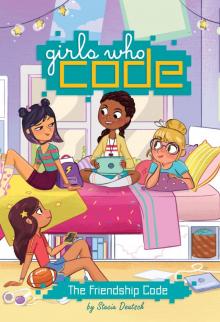 The Friendship Code #1
The Friendship Code #1 Spirit Riding Free: PALs Forever
Spirit Riding Free: PALs Forever Ghostbusters Movie Novelization
Ghostbusters Movie Novelization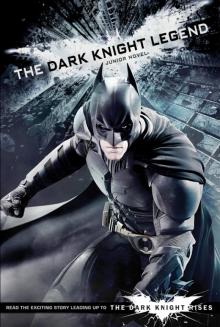 The Dark Knight Legend
The Dark Knight Legend Cinnamon Bun Besties
Cinnamon Bun Besties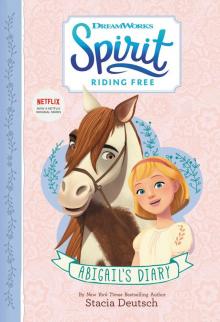 Spirit Riding Free: Abigail's Diary
Spirit Riding Free: Abigail's Diary Spirit Riding Free--Pru's Diary
Spirit Riding Free--Pru's Diary Diary of an Evil Queen
Diary of an Evil Queen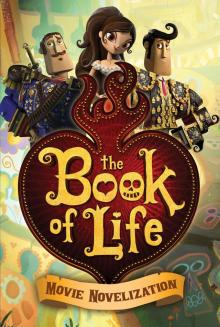 The Book of Life Movie Novelization
The Book of Life Movie Novelization Ben Franklin’s Fame
Ben Franklin’s Fame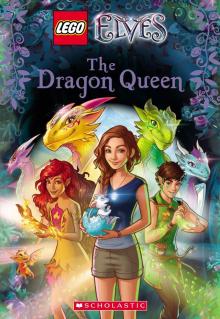 The Dragon Queen
The Dragon Queen Sacagawea's Strength
Sacagawea's Strength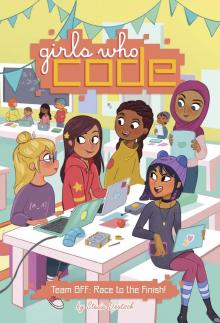 Team BFF--Race to the Finish! #2
Team BFF--Race to the Finish! #2 Spirit Riding Free: Lucky's Diary
Spirit Riding Free: Lucky's Diary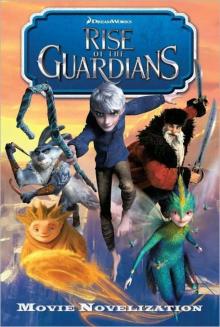 Rise of the Guardians Movie Novelization
Rise of the Guardians Movie Novelization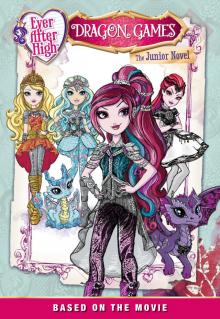 Dragon Games
Dragon Games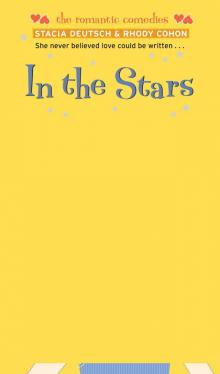 In the Stars
In the Stars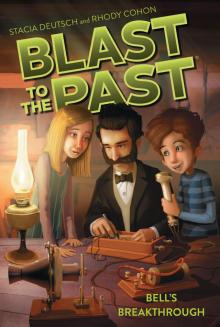 Bell’s Breakthrough
Bell’s Breakthrough